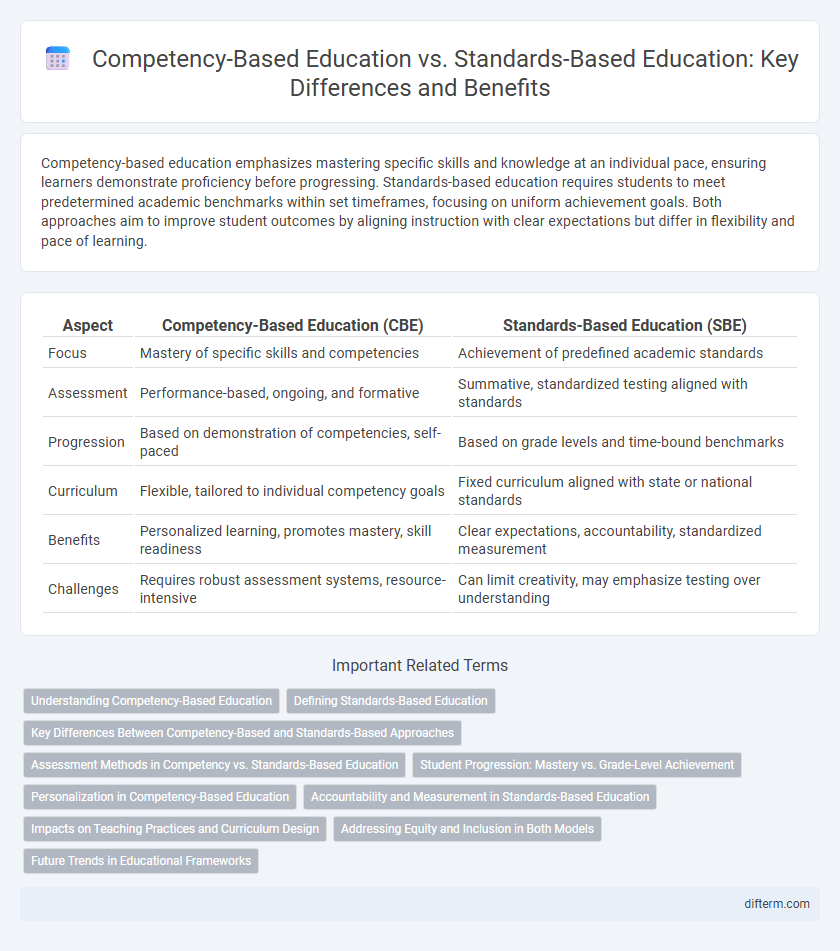Competency-based education emphasizes mastering specific skills and knowledge at an individual pace, ensuring learners demonstrate proficiency before progressing. Standards-based education requires students to meet predetermined academic benchmarks within set timeframes, focusing on uniform achievement goals. Both approaches aim to improve student outcomes by aligning instruction with clear expectations but differ in flexibility and pace of learning.
Table of Comparison
| Aspect | Competency-Based Education (CBE) | Standards-Based Education (SBE) |
|---|---|---|
| Focus | Mastery of specific skills and competencies | Achievement of predefined academic standards |
| Assessment | Performance-based, ongoing, and formative | Summative, standardized testing aligned with standards |
| Progression | Based on demonstration of competencies, self-paced | Based on grade levels and time-bound benchmarks |
| Curriculum | Flexible, tailored to individual competency goals | Fixed curriculum aligned with state or national standards |
| Benefits | Personalized learning, promotes mastery, skill readiness | Clear expectations, accountability, standardized measurement |
| Challenges | Requires robust assessment systems, resource-intensive | Can limit creativity, may emphasize testing over understanding |
Understanding Competency-Based Education
Competency-based education focuses on students demonstrating mastery of specific skills or knowledge at their own pace, prioritizing personalized learning over time-bound progression. This approach assesses learning through practical application and performance tasks rather than traditional exams, emphasizing real-world competencies. Schools adopting competency-based models often use detailed rubrics to measure student achievement against clearly defined proficiencies.
Defining Standards-Based Education
Standards-based education centers on clearly defined learning objectives that specify what students should know and be able to do at each grade level. It emphasizes measurable academic outcomes aligned with state or national standards, ensuring consistency across schools and districts. This approach facilitates targeted instruction and assessment by focusing on mastery of essential skills and knowledge rather than time spent in class.
Key Differences Between Competency-Based and Standards-Based Approaches
Competency-based education emphasizes mastery of specific skills and knowledge through personalized pacing, allowing students to progress upon demonstration of proficiency. Standards-based education focuses on meeting predefined grade-level benchmarks across a curriculum, assessing student performance relative to fixed standards. Key differences include the flexibility of learning timelines in competency-based models versus the uniform expectations and assessment periods in standards-based systems.
Assessment Methods in Competency vs. Standards-Based Education
Competency-based education employs formative and performance-based assessments to evaluate learners' mastery of specific skills and real-world tasks, emphasizing individualized progression. Standards-based education relies on summative assessments aligned with established benchmarks to measure student proficiency relative to grade-level expectations. The distinct focus on personalized skill demonstration versus uniform standard attainment defines the divergent assessment methodologies in these educational approaches.
Student Progression: Mastery vs. Grade-Level Achievement
Competency-based education emphasizes student progression through mastery of specific skills and knowledge at an individualized pace, ensuring learners fully understand content before advancing. Standards-based education prioritizes grade-level achievement where students are assessed against predetermined benchmarks within a fixed timeline, moving forward as a cohort regardless of mastery. This contrast highlights personalized learning in competency-based models versus uniform assessment criteria in standards-based systems.
Personalization in Competency-Based Education
Competency-based education (CBE) emphasizes personalization by allowing students to progress at their own pace, mastering specific skills before advancing, which contrasts with the uniform benchmarks of standards-based education. Personalized learning paths in CBE cater to individual student strengths and needs, promoting deeper understanding and skill acquisition. This approach enhances student engagement and supports diverse learning styles by focusing on demonstrated competencies rather than time spent in class.
Accountability and Measurement in Standards-Based Education
Standards-based education emphasizes clear learning outcomes measured through specific benchmarks, enhancing accountability by tracking student progress against defined standards. This approach relies on standardized assessments and performance criteria to ensure consistent evaluation and comparability across diverse educational settings. Consequently, educators and stakeholders can identify gaps and implement targeted interventions, fostering continuous improvement in student achievement.
Impacts on Teaching Practices and Curriculum Design
Competency-based education prioritizes mastery of specific skills, leading educators to tailor instruction and assessment to individual student progress, which promotes personalized learning paths. Standards-based education emphasizes uniform achievement benchmarks, guiding curriculum design towards consistent content delivery and standardized assessments across classrooms. Both approaches influence teaching practices by shaping lesson planning, assessment strategies, and the flexibility educators have in addressing diverse learner needs.
Addressing Equity and Inclusion in Both Models
Competency-based education (CBE) prioritizes personalized learning pathways and mastery of skills, offering flexible pacing that supports diverse student needs and promotes equitable access to learning. Standards-based education emphasizes consistent achievement of predefined academic benchmarks, ensuring all students meet essential knowledge requirements while enabling targeted interventions for those who struggle. Both models address equity and inclusion by accommodating varied learning styles and providing tailored support, but CBE's individualized approach may offer greater responsiveness to students' unique contexts and abilities.
Future Trends in Educational Frameworks
Future trends in educational frameworks emphasize a shift toward competency-based education, which prioritizes mastery of skills and personalized learning pathways over traditional standards-based benchmarks. Competency-based models facilitate real-time assessment and adaptive instruction tailored to individual student progress, promoting deeper understanding and lifelong learning skills. Integration of technology and data analytics increasingly supports this evolution by providing precise feedback and flexible pacing aligned with workforce demands.
Competency-based education vs standards-based education Infographic

 difterm.com
difterm.com